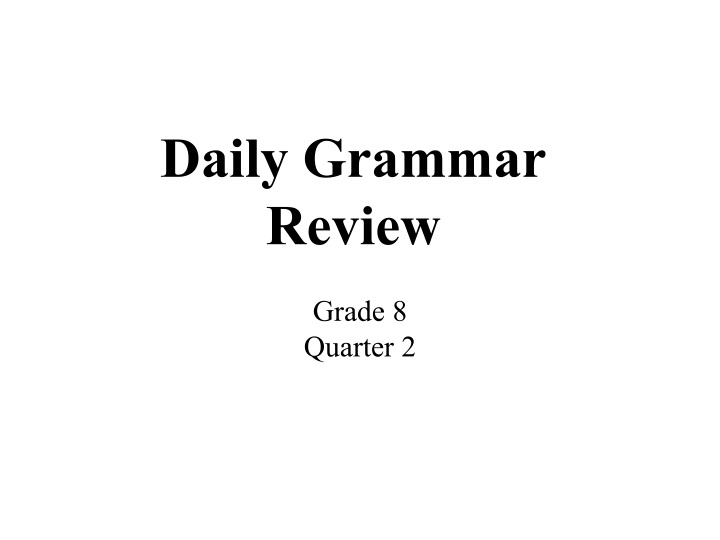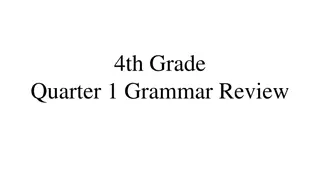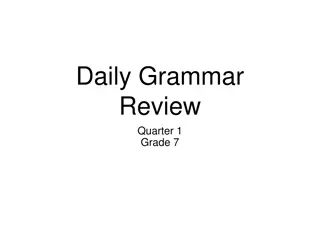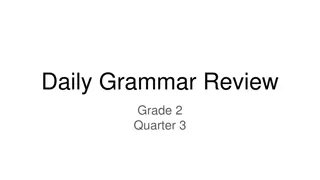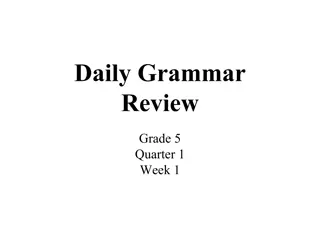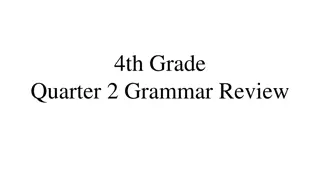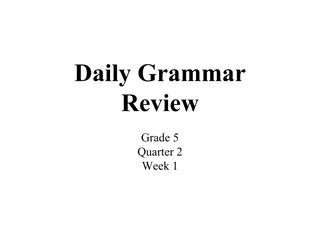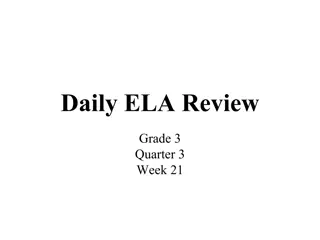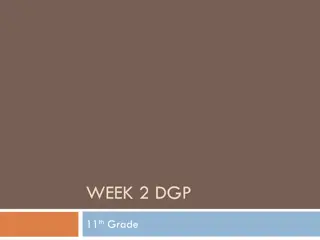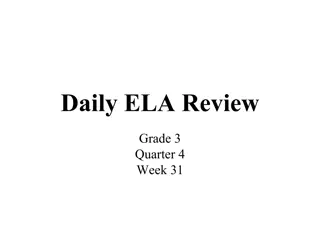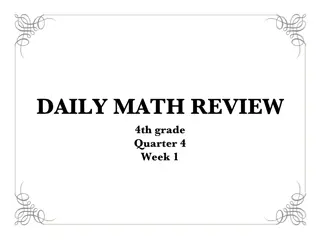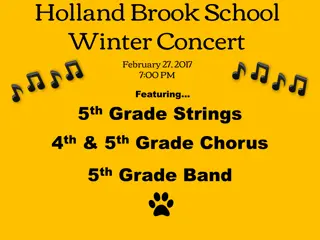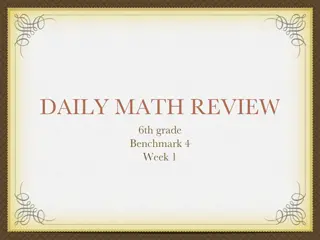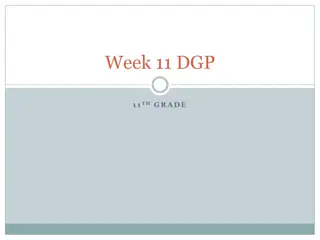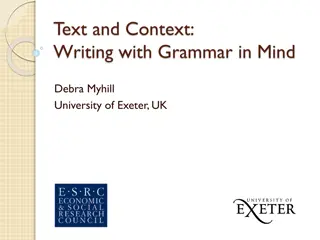Daily Grammar Review Challenges for Grade 8 Students
Engage in a week-by-week grammar review for 8th-grade students. The lessons consist of identifying declarative or interrogative sentences, punctuating sentences with periods or question marks, and distinguishing between exclamatory and imperative sentences. Enhance your grammar skills with daily exercises.
Download Presentation

Please find below an Image/Link to download the presentation.
The content on the website is provided AS IS for your information and personal use only. It may not be sold, licensed, or shared on other websites without obtaining consent from the author.If you encounter any issues during the download, it is possible that the publisher has removed the file from their server.
You are allowed to download the files provided on this website for personal or commercial use, subject to the condition that they are used lawfully. All files are the property of their respective owners.
The content on the website is provided AS IS for your information and personal use only. It may not be sold, licensed, or shared on other websites without obtaining consent from the author.
E N D
Presentation Transcript
Daily Grammar Review Grade 8 Quarter 2
Week 1: Day 1 Directions: Identify if the sentence is declarative or interrogative. 1. I m going swimming today. 2. Is the president addressing the nation on television tonight? 3. My grandfather was an army sergeant. 4. Mitchell plans to audition for the choir. 5. Margaret bought this dress in Mexico.
Week 1: Day 2 Directions: Identify if the sentence is declarative or int. (interrogative). 1. Claire, will you help me practice my lines? 2. Are you going to camp this summer? 3. You are good at solving puzzles. 4. How long did it take you to read The Red Badge of Courage? 5. Our soccer team won the league championship.
Week 1: Day 3 Directions: Identify if the sentence is declarative orinterrogative. 1. The butterfly slowly unfolded its wings. 2. The wind knocked down a large tree. 3. Have you met the new teacher yet? 4. Which wrestlers won their matches? 5. The title of the mystery novel was misleading.
Week 1: Day 4 Directions: Punctuate each of the following sentences with a period or question mark. 1.Have you met Danielle yet 2.Who is hungry 3.This computer doesn t work 4.The fire engines roared past us 5.Suzanne wandered home from school
Week 1: Day 5 Directions: Punctuate each of the following sentences with a period or question mark. 1. Did Clyde get the part he wanted in the musical comedy 2. The desk was cluttered with all kinds of papers 3. Janice and Shawna went to the movies last night 4. Will you put up a new bulletin board 5. Will Pablo know what to do
Week 2: Day 1 Directions: Identify if the sentence is exclamatory or imperative. Add a period or an exclamation point as needed. 1. Don t stay up too late 2. What a terrific day we had at the zoo 3. Watch out for that low branch 4. Tell me more about your fishing trip 5. Don t run in the halls
Week 2: Day 2 Directions: Identify if the sentence is exclamatory or imperative. Add a period or an exclamation point as needed. 1.Buy more glue when you go to the store 2.Clean up your desk, please 3.Let s go watch the parade 4.That muddy dog just stole my hamburger 5.Try to solve the puzzle before the contestant does
Week 2: Day 3 Directions: Identify if the sentence is exclamatory or imperative. Add a period or an exclamation point as needed. 1. Let the baby sleep 2. Oh, you just sat in some wet paint 3. Feed the dog at the same time every day 4. Turn in your book report next week 5. I can t wait until Grandma gets here
Week 2: Day 4 Directions: Identify if the sentence is exclamatory or imperative. Add a period or an exclamation point as needed. 1. Go to sleep 2. Walk through the flower bed carefully 3. Speak louder 4. I have never felt so frightened 5. Play that song again
Week 2: Day 5 Directions: Identify if the sentence is exclamatory or imperative. Add a period or an exclamation point as needed. 1. Be home by ten o clock 2. Wait for me at the corner 3. Put more paint on the other side 4. Don t cross the street against the light 5. Wait for an hour before you go swimming
Week 3: Day 1 Directions: Identify if each group of words is a sentence, expressing a complete thought or a fragment, that does not express a complete thought. 1. The survivors of the earthquake showed great courage. 2. Caused problems everywhere. 3. Every Sunday their family went hiking. 4. Even the rain couldn t dampen their spirits. 5. Ride calmly and quietly in the backseat.
Week 3: Day 2 Directions: Identify if each group of words is a sentence, expressing a complete thought or a fragment, that does not express a complete thought. 1. Rose in the air like a bird. 2. Of his meal untouched. 3. Hundreds of firefighters fought the forest fires last summer. 4. The thought escaped him. 5. As fragile as glass.
Week 3: Day 3 Directions: Identify if each group of words is a sentence, expressing a complete thought or a fragment, that does not express a complete thought. 1. Our newspaper arrived late on Tuesday. 2. Janette, who s coming at four. 3. Simply everywhere. 4. Postponed for the second time. 5. Ted climbed to the top of the stadium.
Week 3: Day 4 Directions: Write a complete sentence by adding a subject, a predicate, or both to each sentence fragment. Punctuate your sentences correctly. 1. Marla and Kimberly. 2. On the shelves. 3. Dusted the books. 4. Maple and Elm trees. 5. Greeted Eloisa.
Week 3: Day 5 Directions: Write a complete sentence by adding a subject, a predicate, or both to each sentence fragment. Punctuate your sentences correctly. 1.The mystery of space. 2. Carmen and her sister. 3. Saw the falling star. 4. Flat, sandy fields. 5. Busy traffic.
Week 4: Day 1 Directions: Identify each of the following as either a simple sentence, compound sentence, or run-on sentence. 1. Ketchup makes french fries taste better. 2. I walked and walked for days. 3. Hydrogen has weight, but you can t weigh it on an ordinary scale. 4. Air is taken into the lungs oxygen is absorbed into the bloodstream. 5. You can buy your ticket in advance, or you can buy it at the door.
Week 4: Day 2 Directions: Identify each of the following as either a simple sentence, compound sentence, or run-on sentence. 1. Radar detects objects in darkness and bad weather. 2. Humans can t see well in the dark, nor can they hear sounds more than about one kilometer away. 3. I read it, but I didn t understand it. 4. Korean foods and Thai foods can be very spicy. 5. You can ask questions, but you may not find the answers.
Week 4: Day 3 Directions: Identify each of the following as either a simple sentence, compound sentence, or run-on sentence. 1. The choir sang and clapped for the audience. 2. Neither fog nor hail stops the letter carrier. 3. Max found the light bulb he couldn t find a ladder. 4. The first modern computer was built in 1946; it processed 5,000 calculations per minute. 5. The South American condor is smaller and heavier than the California condor.
Week 4: Day 4 Directions: Identify each simple subject (s.s.), each simple predicate (s.p.) and each coordinating conjunction (c.c). 1. The athletes ran for a long time, and they breathed hard. 2. I went there last year, but I cancelled my reservation this year. 3. She called me, but she wrote more often. 4. I studied hard, and I passed the test. 5. Did you find it, or do you need my help?
Week 4: Day 5 Directions: Identify each simple subject (s.s.), each simple predicate (s.p.) and each coordinating conjunction (c.c). 1. The skies were cloudy, but I saw no rain. 2. He just sat there; nobody talked to him. 3. Most plants require plenty of sunlight, but some plants thrive in low light. 4. Colorado is a beautiful state, and it has nice weather. 5. The game was close, but we won it in the last minute.
Week 5: Day 1 Directions: Identify each proper noun. Capitalize where needed. 1.A baby named martin luther king jr. was born in atlanta, Georgia. 2.His family lived in a two-story house on Auburn avenue. 3.His father, martin Luther King sr., was a minister and the son of a sharecropper. 4.His mother, Alberta williams king, was a teacher. 5.King skipped two grades at booker T. Washington high school.
Week 5: Day 2 Directions: Identify each common noun. 1. Still a teenager, King graduated from Morehouse College. 2.King first thought of becoming a doctor or a lawyer but finally decided to go into the ministry. 3. While still at Morehouse, King was ordained in the church of his father. 4.King was elected co-pastor at the church upon his graduation from college. 5. The hardworking young man went on to graduate school at Crozer Theological Seminary in Chester, Pennsylvania.
Week 5: Day 3 Directions: Identify each concrete noun. 1. A commercial pilot must have a lot of flying experience. 2. My uncle, aunt, and cousin live in a large trailer. 3. The judge reminded the witness to tell the truth. 4. The inventor had an idea that would help the auto industry improve safety. 5. The playful beagle liked to chase its tail.
Week 5: Day 4 Directions: Identify each abstract noun. 1. The hardworking farmer was disappointed with the weather. 2.The walls and ceiling of the room were black with age and dirt. 3.Clouds covered the sun and sky. 4.Many people voted in the elections last fall. 5.The veterinarian spent time and energy examining horses.
Week 5: Day 5 Directions: Identify the verb form in parentheses that best completes each sentence. 1. The book club (discusses, discuss) their personal opinions of the plot. 2. The class (is, are) going on a bus to the art museum. 3. The choir from East High School (sings, sing) the loudest. 4. The elephant herd (makes, make) a thundering noise during a stampede. 5. The baseball team (boasts, boast) an excellent batting average.
Week 6: Day 1 Directions: Underline the action verb in each sentence and identify if the verb expresses a physical action or a mental action. 1. Long ago, medieval knights fought battles atop powerful horses. 2. Lighter horses carried lords and ladies on fox hunts. 3. Children especially love shaggy, bright-eyed ponies. 4. Later, the wealthy traveled in horse-drawn carriages. 5. Farmers also relied on horses in the past.
Week 6: Day 2 Directions: Underline the correct helping verb in the set of parentheses. 1. Ricardo and Craig (are, have) arriving tomorrow. 2. Our team (was, had) worked hard to win the pennant. 3. Sally (is, has) joining our debate team. 4. My dog Rusty (is, has) always barking at something. 5. The class (is, has) going to the museum.
Week 6: Day 3 Directions: Underline the correct helping verb in the set of parentheses. 1. The buses (were, had) arrived late at the auditorium. 2. The workers (had, were) painted the bleachers for the first time. 3. My bike (is, has) working fine since it was in the shop. 4. Mason s sisters (are, have) played many women s sports. 5. Dad (was, had) looked everywhere for his keys.
Week 6: Day 4 Directions: Identify whether the sentence is in the active or passive voice. 1. A solar eclipse was predicted by Thales of Miletus in 585 B.C. 2. Hipparchus established an observatory in the third century B.C. 3. A supernova, or exploding star, was recorded by Chinese astronomers in 1054. 4. According to the Greek astronomer Ptolemy, the sun and the planets circled Earth once a day. 5. In 1543, a new theory was suggested by a Polish astronomer, Copernicus.
Week 6: Day 5 Directions: Identify whether the sentence is in the active or passive voice. 1. In this theory, Earth and other planets orbited the sun. 2. The use of Copernicus s theory was forbidden by religious leaders until 1757. 3. However, persons were convinced about Copernicus s theory by the discoveries of other astronomers. 4. The law of universal gravitation was discovered by Sir Isaac Newton. 5. The Copernican theory gained support after this discovery.
Week 7: Day 1 Directions: Underline the pronoun in parentheses that best completes each sentence. 1. Jan and (she, her) are our class representatives. 2. Are you going to come with Rudy and (I, me)? 3. The tallest player on the team is (he, him). 4. My sister always says (we, us) Kozlowskis stick together! 5. What did (they, them) do for their history project?
Week 7: Day 2 Directions: Underline the pronoun in parentheses that best completes each sentence. 1. The award was given to Dale and (she, her). 2. If you ask (I, me), there s too much emphasis on winning. 3. Please give (she, her) the letter. 4. The president asked (we, us) citizens to make some sacrifices. 5. If you have any questions, talk to Ms. Ramirez or (I, me).
Week 7: Day 3 Directions: Underline the pronoun in parentheses that best completes each sentence. 1. Chang Ch ien lived during the second century B.C. in China and was an officer in (its, others) army. 2. (Yours, His) explorations helped the Han dynasty to flourish. 3. (Its, Some) emperor at the time, Wu-Ti, sent him on many missions. 4. During (his, my) lifetime, China was invaded by the Huns, a fierce warrior people. 5.Finally, the Chinese emperor, Wu-ti, decided that (something, several) had to be done about the marauding Huns.
Week 7: Day 4 Directions: Underline the pronoun in parentheses that best completes each sentence. 1. Wu-ti knew that China needed an ally in (its, either) fight against the Huns. 2. (My, His) choice was a people called the Yueh-chih from central Asia. 3. (Few, Either) knew the exact location of the Yueh-chih. 4. To find them, (somebody, their) would have to undertake a dangerous search through unknown country. 5. China was a large kingdom, but (its, much) western border had not been completely explored.
Week 7: Day 5 Directions: Underline each interrogative pronoun. 1. Whom did you see behind the curtain? 2. Which is the Grand Champion ewe? 3. Who ate the last piece of cake? 4. What are Jeff and Kevin talking about? 5. Whose is the yellow house on Vine Street?
Week 8: Day 1 Directions: Identify each word that should be capitalized. 1. the speaker is a famous expert on bats, Jon explained. 2. don t you think bats are a little unpleasant? I asked Jon. 3. Not at all, Jon replied. they re one of the most helpful animal species around. 4. they re not too helpful, my friend quipped, when they swoop down at me. 5. Ha-ha-ha, laughed Jon. you two need a lesson about bats.
Week 8: Day 2 Directions: Underline the choice in parentheses that best completes each sentence. 1. We watched as (General, general) Powell told the nation about the war. 2. The sign on the door read Alvaro de Leon, (M.D., m.d.) 3. Let s ask (Aunt, aunt) Mary to tell us the story again. 4. The woman driving the tank was (Captain, captain) Jenny Monroe. 5. My sister has decided to go to medical school to become a (Doctor, doctor).
Week 8: Day 3 Directions: Identify each word that should be capitalized. 1. Two hundred years ago, all of the country s largest cities were located in the northeast and along the Atlantic ocean. 2. These cities, including boston, New york, Philadelphia, and baltimore, are still large and important places. 3. Once settlers crossed the appalachian mountains, cities began to grow. 4. New states like illinois, missouri, and minnesota had joined the union, and their cities soon became new centers of power. 5. For example, St. Louis, near the junction of the missouri river and the mississippi river, quickly became a vital center of transportation.
Week 8: Day 4 Directions: Identify each word that should be capitalized. 1. During the reformation, protestants broke away from the catholic church. 2. T.J. was reading a book called How to attract bats to your backyard. 3. We are flying on United airlines flight 289 to los Angeles. 4. In Ohio the summer season runs from june through september. 5. At the ethiopian restaurant, we had the most delicious pumpkin dish.
Week 8: Day 5 Directions: Identify each word that should be capitalized. 1. Our cousins will be staying with us the week before new year s day. 2. The exhibit of laotian embroidery was a real eye-opener! 3. The seminar is sponsored by a united nations organization. 4. Our toughest opponent this season will be hastings middle school. 5. Have you ever read the poem stopping by woods on a snowy evening ?
